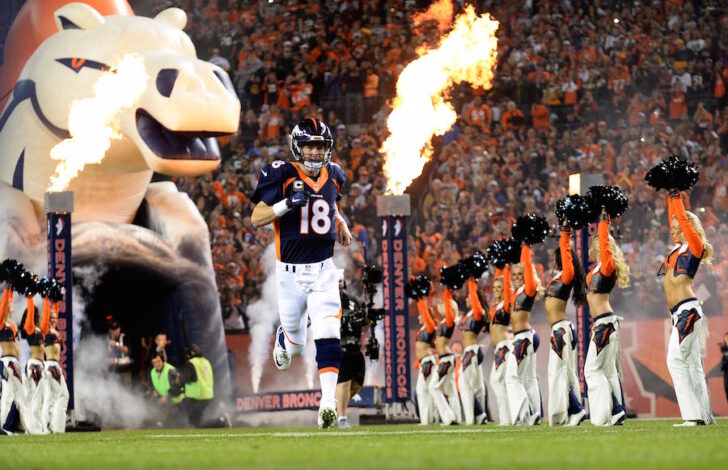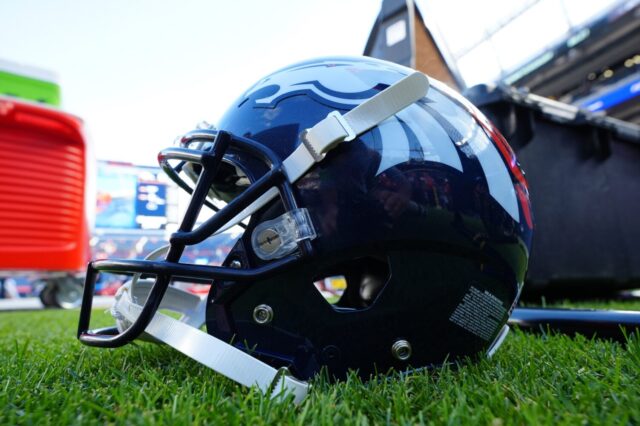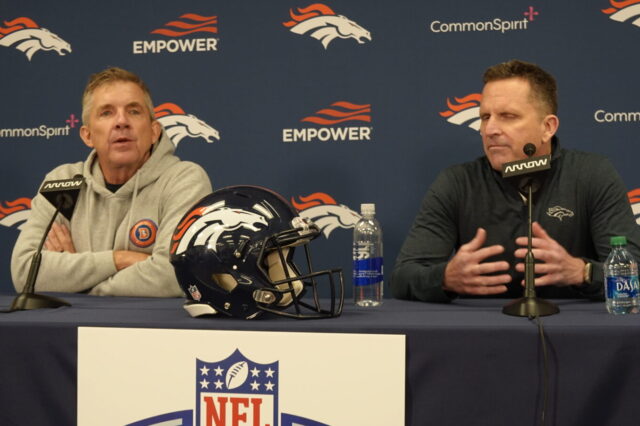Legacies are usually written over a long period of time, established through years of work and a litany of accomplishments. And typically speaking, they are defined more by what happened over the long haul than during a short period of time.
But that won’t be the case during the next three weeks. Between now and Super Bowl 50, Peyton Manning can all but erase the blemishes that his detractors like to point out when talking about his distinguished career.
It’s a familiar refrain, one that surely the Broncos quarterback knows all too well. No. 18 is widely considered the best regular season signal caller to ever play in the National Football League. But he’s also thought of as a guy who just couldn’t get it done in the postseason.
Of course, that’s an incredibly unfair assessment, one that fails to take into account the coin-flip nature of NFL playoff games or the fact that pro football is perhaps the ultimate team sport. But that notion exists; despite all the records and “Star Wars numbers,” Manning’s career is missing the type of postseason exclamation mark that would etch him onto the league’s Mount Rushmore of quarterbacks for eternity.
That can all change in the next 24 days, however. With three more wins, the last of which would be a victory in Super Bowl 50, all of the past failings will be forgotten. With a trio of W’s, capped by an historic title that would complete one of the greatest comeback stories in NFL history, the previous setbacks will no longer be a pockmark on Manning’s brilliant career.
For an example of this happening, Broncos fans need to look no further than the greatest player in the history of the franchise. John Elway went down much the same path, redefining his place in the sport’s annals by having playoff success late in his career.
Heading into the 1997 season, No. 7 was already a legend in Denver; he was almost universally beloved in the Mile High City. But around the country, there was another sentiment about Elway; his career was viewed differently outside of Colorado than it was within the Centennial State’s rectangular borders.
By and large, Elway was considered an athletic, big-armed quarterback who was able to make a lot of amazing plays, but wasn’t a polished enough passer to win championships. While he might make the highlight reels with his come-from-behind wins, rocket passes and ability to scramble, the Duke of Denver wasn’t mentioned in conversations about the all-time greats.
That seems crazy to think now, as Elway is widely regarded as one of the top-five quarterbacks to ever play the game. But nearly 20 years ago, that wasn’t the case. And it was largely due to the QB’s playoff failings.
Prior to the 1997 season, No. 7’s postseason résumé looked a lot like Manning’s does today. And just like No. 18, the common fan and/or out-of-town media member saw the numbers and used them as a way to diminish Elway’s accomplishments.
At the time, Elway was a very pedestrian 7-8 in the playoffs during his career. That mark included three Super Bowl trips, each of which ended in progressively more disastrous fashion. There was also a less-than-stellar performance in the 1991 AFC Championship Game, where Elway failed to put a point on the board before being injured, but did throw a costly pick-six in a 10-7 loss at Buffalo. And he even had a couple of first-round fizzles, including losses as the No. 1 seed in 1984 to a Steelers team that finished the season 8-8 and again as the AFC’s top team in 1996 to the happy-just-to-be-there Jaguars.
It all added up to the prevailing notion that Elway couldn’t win the big one; he could win a lot of regular season games, often in spectacular fashion, but his style of play wasn’t suited for winning championships.
That sounds familiar.
Of course, that all changed in 1997, and was capped off in 1998, when the Broncos rolled off seven consecutive postseason victories en route to back-to-back championships. Those wins, and the two Lombardi Trophies that came with them, vanquished the previous thoughts about Elway; earlier failures were trumped by late victories.
What’s ironic is that the Hall of Fame quarterback didn’t even play well in most of those wins. Sure, he had some iconic moments, and he came up big in key spots, but his numbers were less than dazzling.
During those seven playoff victories, Elway connected on just 55 percent of his passes, averaging less than 15 completions per game. He threw six touchdowns, less than one per outing, and tallied three interceptions. And he averaged just 202.4 passing yards per game, failing to eclipse the 200-yard mark in four of the seven games.
Those are journeyman-type numbers, the type posted by players that we now deem to be “game managers.” But that didn’t matter. No one cared that the Broncos rode Terrell Davis to those Super Bowl titles; the postseason victories and two rings rounded out Elway’s résumé, catapulting him above the likes of Jim Kelly and Dan Marino, two players who were largely considered better than him during their playing careers.
Between now and Feb. 7, Manning can do the same thing. With three more playoff wins, no matter if they come on the strength of stout defense rather than his right arm, No. 18 will erase almost all of the possible criticism of his career.
He’d be above .500 in career postseason wins, improving to 14-13. He’d trail only Tom Brady and Joe Montana for most playoff wins of all-time, tying Terry Bradshaw and John Elway for third place on that distinguished list. He’d become only the seventh quarterback ever to start in four or more Super Bowls. And he’d be only the 12th quarterback in history to win multiple Super Bowls, becoming the first to do it as the starter with two different franchises.
Combine that legacy with his other marks – including the most passing yards of all-time, the most regular-season wins (tied) in NFL history and the greatest single season the league has ever seen – and it would be hard for even the biggest naysayer or critic to knock Manning’s career achievements. There wouldn’t be a blemish left on his résumé.
In 1997, Elway thought he had one last chance to right previous wrongs. Eighteen years later, another Broncos quarterback has the opportunity to do the same thing.
With just three more wins, Peyton Manning’s legacy can be cemented forever.



